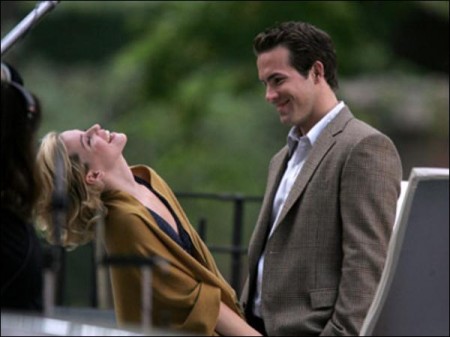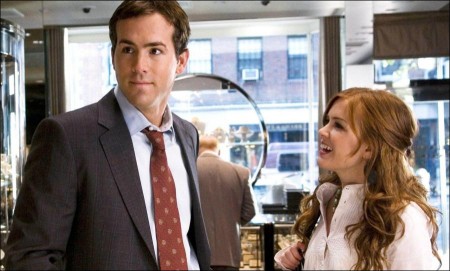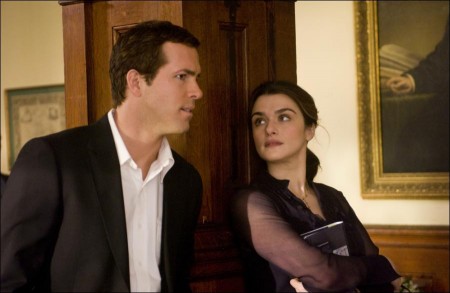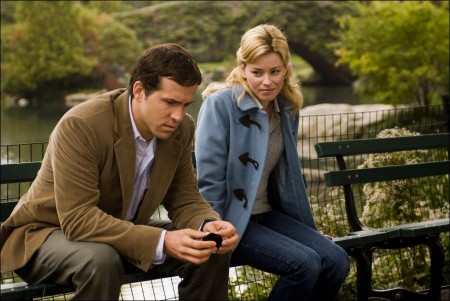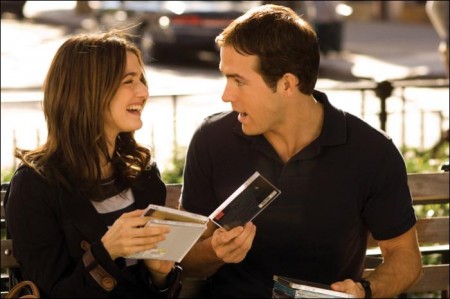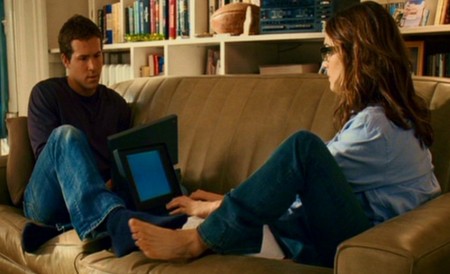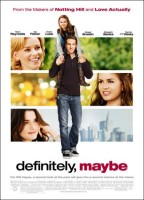Tagline: Three relationships. Three disasters.
Will, a 30-something Manhattan dad in the midst of a divorce, is surprised when his 10-year-old daughter, Maya (Breslin), starts to question him about his life before marriage. Maya wants to know absolutely everything about how her parents met and fell in love.
His story begins in 1992, as a young, starry-eyed aspiring politician who moves to New York from Wisconsin in order to work on the presidential campaign. For Maya, Will relives his past as an idealistic young man learning the ins and outs of big city politics, and recounts the history of his romantic relationships with three very different women.
Will hopelessly attempts a gentler version of his story for his daughter and changes the names so Maya has to guess who is the woman her dad finally married. Is her mother Will’s college sweetheart, the dependable girl-next-door Emily? Is she his longtime best friend and confidante, the apolitical April (Fisher)? Or is she the free-spirited but ambitious journalist Summer?
As Maya puts together the pieces of her dad’s mystery love story, she begins to understand that love is not so simple or easy. And as Will tells her his tale, Maya helps him understand that it’s definitely never too late to go back… and maybe find a happy ending.
Mixing Politics and Romance: Definitely, Maybe is Greenlit
Definitely, Maybe was born a few years ago, when writer / director Adam Brooks decided to pen a love story that spanned more than one decade. “There used to be a tradition of movies that took place over a long period of time,” the filmmaker says, “and what I loved about them was how much you would get invested in the characters because of the long span of the story.” The romantic comedy Brooks envisioned, along with its unusual twist of a male protagonist driving the story, was given a complicated setting: the world of politics.
“I like the tradition of romantic comedies that have a bigger backdrop than just the love story that’s going on-a movie like Broadcast News, for example,” adds Brooks. “I always wanted to do a story about a young man coming to the big city with all his hopes and dreams.”
In the screenplay, Brooks’ main character, Will Hayes, is a soon-to-be-divorced dad who relives his early years as an aspiring politician, while he tries to explain to his 10-year-old daughter how he came to marry the woman he is now divorcing: her mother.
As a screenwriter, Brooks had previously collaborated with the U.K.-based Working Title Films on several projects, including Bridget Jones: The Edge of Reason, Wimbledon and French Kiss. His long-time collaborators approached him with the idea of not only writing, but also directing his next romantic comedy. They agreed it would-in no way-be generic or formulaic.“They’re my movie home,” Brooks describes. “I write with total confidence and trust when I’m working with them. And I know that when you’re developing a movie with Working Title, there’s a very good chance that it’s going to get made.”
The production company, headed by Eric Fellner and Tim Bevan, has recently produced such films as Atonement, United 93, Mr. Bean’s Holiday, Love Actually, The Interpreter, Notting Hill and O Brother, Where Art Thou? and retains long, continuous creative collaborations with such talent as Richard Curtis, Hugh Grant, Cate Blanchett, Keira Knightley, the Coen Brothers, Colin Firth, Rowan Atkinson and Emma Thompson, among many others.
It has remained important for Fellner and Bevan to offer filmmakers, as Fellner summarizes, “studio resources with the filmmaking attitude of an independent.” Brooks’ latest project was no exception. “If you find talented people-writers or directors or actors-and you work with them on a regular basis,” explains Fellner “it just goes like an incredible shorthand with a trust that develops.”
The characters in Brooks’ script for Definitely, Maybe appealed to the producers, who enjoyed the fact that the story was not just about how two people fall in love, with the concomitant pitfalls that keep them apart. “I liked the idea of trying to build a film around a number of relationships, not just one,” Fellner states.
Working Title’s Liza Chasin, who served as executive producer on such films as Pride & Prejudice and Bridget Jones: The Edge of Reason, had worked with Brooks on eight projects and would serve as executive producer on Definitely, Maybe. She describes the decision for Brooks to direct as an easy one, surmising, “It was a natural progression in the relationship that he was going to direct the next project.”
Fellner agreed that Brooks, who had previously helmed Almost You, starring Griffin Dunne and Brooke Adams, as well as The Invisible Circus, starring Cameron Diaz, was the correct choice to helm Definitely, Maybe. “He came up with it; he created it; he knew it,” says Fellner. “We were keen for him to have that opportunity.”
Most critical in casting the players was to start with the film’s central character, aspiring politico Will Hayes. With his work as FBI Special Agent Richard Messner in Working Title’s 2007 action-thriller Smokin’ Aces, actor Ryan Reynolds had duly impressed the company filmmakers. They suggested Brooks consider him for Definitely, Maybe’s central character. “Ryan can do comedy; he can do drama,” relates Fellner. “We had just done Smokin’ Aces, and the studio and I thought that he’s definitely a major star.”
When Brooks first met Reynolds, the director was struck by the actor’s take on Will Hayes. “One of the first things he said to me is, `It’s like a Jimmy Stewart part,’” Brooks recalls. “And that’s always how I had imagined it. What I sensed when I met him was an immediate appeal and an everyman quality that is hard to find.”
Furthermore, Reynolds’ versatility was key to his landing the role of Will. “I think Ryan has that ability to be absolutely convincing in the world that he creates around him, and yet still have impeccable comic timing,” lauds Brooks.
In telling the story of his rather complicated romantic life to his daughter, Will changes the names of the three most influential loves of his life. This way, his precocious daughter doesn’t know which woman in the story he ends up marrying-and then divorcing-until he’s done with her bedtime story.
For the actor, Definitely, Maybe was a departure from other comedic roles, such as Waiting and Just Friends, in which he had performed. “I always say it’s a romantic whodunit,” Reynolds provides. “With most romantic comedies, you can see where they’re going by page two. This is one that I had no idea what was going to happen until the last page.”
Reynolds saw Will as a man shaped by multiple influences: primarily by his daughter and the three great loves of his life, but also by New York City. After his Democratic candidate wins the presidency, Will starts a political consulting firm with his best friend, Russell (Derek Luke).
Another crucial influence upon Will, according to Reynolds, is our 42nd president, his personal hero. “He was our JFK-there is a sense that he was my president, that he was going to do something,” Reynolds relates.
By the time impeachment proceedings against the president take place in 1998, however, Will is more than a bit disillusioned with politics, and with the trajectory of his own life. Questions from “Whom am I really supporting after all?” to “Why did I get into this field in the first place?” plague Will. Reynolds offers, When we have these notions of people that are our saviors, but then they crash and burn and become human…sometimes we do as well.”
Three Perfect Women and a Precocious Child: Casting the Film
After leaving the Midwest to pursue his political dreams, one of the first people Will meets upon his arrival in New York City is Summer Hartley, a sophisticated graduate student who is having an affair with her much-older professor. To cast the role of Summer, producer Fellner suggested British actress Rachel Weisz, who had starred in Working Title’s About a Boy, and who had recently won the Academy Award for Working Title’s The Constant Gardener. “We are always looking for things for Rachel,” says Fellner. The producer, aware that Weisz was hoping to work on a romantic comedy, commends, “She’s very funny; she’s got a great sense of humor and a very light touch.”
Writer / Director Brooks agreed with his producers’ instincts and hoped to cast a woman who, in the words of Chasin, would cause Will to “buckle at the knees.” He notes, “Rachel has an aura, charisma and power to her that the character of Summer demanded.”
As Will’s friendship with Summer develops into romance, she kick-starts her journalism career by following the political beat, which eventually results in a conflict of interests for both Will and her. “Summer is a character who doesn’t really care what people think of her,” Weisz tells it. “She’s very bold, and she’s very ambitious and carefree.”
Another woman in Will’s life is April, an apparently unmotivated nonconformist whom Will meets while working at the presidential campaign headquarters. Unlike the others at the office, April works there simply to earn money. She is, however, quite eager to share her strong opinions with Will. “For April, we knew we needed somebody who was a complete spitfire and a force of nature,” recalls Bobby Cohen. “The character of April is unlike anyone Will has ever met-passionate, caustic, brilliant.”
For April, Adam Brooks met with Isla Fisher, whose earlier comedic work had impressed him. “I was very excited to meet her, because she was great in Wedding Crashers,” remembers Brooks. “After spending an hour with her, I knew that she was right for the part. It was not just her firecracker sense of humor, but the particular way she looked at things and how she talked about the story.”
Fisher brought nuances to the part that surprised the filmmakers. On Fellner: “She manages to turn a slightly dramatic moment, and gives levity in the moments you need to take away from the pain or the angst. She’s brought nothing but brilliance since she started.”
“What I love most about April is that she’s sassy and feisty and she says what she thinks,” says the Australian actress. “Will and April have a very Spencer Tracy / Katherine Hepburn-esque relationship. It’s very combative, but there’s a lot of sexual tension and a lot of love between them.”
Not only was Fisher attracted to the character, she felt that Brooks’ script had something to offer that was not rife with clichés. “Definitely, Maybe is a movie about love,” she provides. “It’s about romantic love, unrequited love, paternal love, lost love and the love between friends.”
For the role of Emily, Will’s college sweetheart who suspects that he will not return to Madison after working on the presidential campaign, the filmmakers cast Elizabeth Banks. The versatile performer, whose credits include dramatic fare from supporting roles in Seabiscuit and Invincible to surprising turns in the horror SLiTHER and the hit The 40-Year-Old Virgin, quickly won over the filmmakers with her interpretation of what could easily be a stock character. “Elizabeth is a great storyteller,” provides Brooks. “She has this ability to be absolutely real and touching and funny.”
For Banks, Definitely, Maybe stood out in its sharp prose, specifically the choices Brooks made for his female characters. “It’s hard to find really well-written female characters to play,” she states. “And this movie has three great ones-all different, yet complementary, which make the story so much more complex and interesting.”
To play the role of Will’s best friend, Russell McCormack, Working Title’s producers suggested another actor with whom they had had a successful collaboration: Derek Luke. “We had just done Catch a Fire,” says Fellner. “And Derek had been brilliant in it.”
Luke, who made his debut in Denzel Washington’s Antwone Fisher, agreed to take the role, drawn to the fact that “these are two different men from two different backgrounds, but they have the same dream,” notes Luke. “Russell, being a very goal-oriented person, gives Will a sense of focus. I believe Will gives Russell a dose of reality with all his dreams and goals.”
The final character who looms large in Will’s life is only 10 years old. “One of the wonderful elements of this movie is that it is as much a love story between Will and his daughter, Maya, as it is between Will and April or Summer or Emily,” says executive producer Cohen.
The search for the right actor to play Maya was quite streamlined after the filmmakers saw the acclaimed comedy Little Miss Sunshine, for which Abigail Breslin received an Oscar nomination for her role as a young beauty pageant hopeful surrounded by a chaotic family. “Like everyone, we were completely blown away by Abby’s performance,” compliments Liza Chasin.
“She’s really an amazing young actress-unbelievably focused and tireless and funny,” shares Brooks. “The qualities we were looking for in all the actors, she has as a 10-year-old. There just didn’t seem like anybody who could touch her in those departments.”
Definitely, Maybe
Abigail Breslin as Maya Hayes and Ryan Reynolds as Will Hayes in Definitely, Maybe.
Breslin, who worked in her hometown of New York City throughout the shoot, describes Definitely, Maybe as a film about change. “I think it’s about forgiving people and moving on-and just going forward,” she says. Maya not only listens to her father’s story, but also interjects comments and observations throughout the tale. She’s, in her own way, a little sassy,” laughs Breslin. “Maya’s very opinionated.”
Breslin appreciated the fact that, by the end of the script, his daughter’s influence on Will becomes very profound. She reflects: “Maya helps him figure out who he really loves.”
Of his principal leading lady, Reynolds brings praise for Breslin’s acting talents. “Abby just sees everything,” he notes. “This little girl is a sponge. The thing that I love most about working with kids like her is that you can’t slide anything past them. You know you can’t lie. It keeps you on your toes.”
Before filming began, the troupe had the rare luxury of an extensive rehearsal period with the film’s director. Brooks’ script called for much of the talent to play iterations of themselves over a 16-year period, and the filmmaker knew they would not only draw from his script, but from decades of their own lives.
As shooting began, he encouraged his actors to improvise off-script. “In the rehearsal period, it’s a chance for everyone to talk about what’s working and what’s not,” Brooks says. “By the time we start shooting, it’s not a question of debating the scene. I’m really happy when we’re shooting and I stop hearing the script-when the words disappear and the script comes to life. I cast actors I felt could do that.”
Reynolds found that his relationship with each of his three leading ladies mirrored his character’s story line. For example, of his pairing with Rachel Weisz, who had just won an Oscar when they began work on Definitely, Maybe, Reynolds was, admittedly, starstruck. “With Rachel, I always felt like a little boy, like Will,” he says. “Summer’s a little bit out of his league. She’s this very sophisticated and intelligent, beautiful woman.”
With Elizabeth Banks, however, Reynolds had a more relaxed relationship, like the one that Will and Emily shared. “Emily is obviously beautiful and fantastic, but from Will’s hometown,” Reynolds tells. “I always feel very comfortable with her; Will feels incredibly safe with her.”
Regarding Isla Fisher and her offbeat character, April, Reynolds didn’t know what to expect. “There’s a mystery about her, and there’s something wonderfully challenging,” Reynolds says.
Casting and rehearsal complete, Brooks and producers Bevan and Fellner would man the process of shooting Definitely, Maybe in one of the world’s largest stages: New York City.
Lensing in Manhattan: Locations, Design and Camerawork
The romantic comedy takes place almost exclusively in New York, spanning 16 years-1992 to 2008-in the lives of not only the characters, but of the metropolis itself. “It was a challenge to tell the story of how the city changed in that time period,” says Brooks. Will Hayes arrives in New York from Madison, Wisconsin, an idealistic and enthusiastic young man. “A lot of kids would come and live here then,” he comments. “Now they can’t afford it.”
For his director of photography, Brooks called upon a family friend, Florian Ballhaus. Son of the legendary cinematographer Michael Ballhaus, Florian Ballhaus and Brooks had known one another since Brooks worked on the elder Ballhaus’ films. The younger Ballhaus has subsequently become a noted cinematographer in his own right, shooting such features as Flightplan and another New York romantic comedy, The Devil Wears Prada. “Prada was spectacular-looking, but more than that, it’s a very personal thing, that collaboration [between director and cameraman],” Brooks suggests. “It’s the most like a marriage. Florian suits me because he’s incredibly rigorous, but also gracious and even-tempered.”
To capture New York City in the early 1990s, Brooks knew he would need to find a production designer who could dovetail her skills with Ballhaus’ to create an era that extended from pre-Giuliani Manhattan to the 2008 sanitized Big Apple. “The city was much grungier, dirtier and not as safe as it is today, but at the same time, it had a lot more edge and youthful energy,” adds the Canadian-born filmmaker, who moved to New York as a young man to attend NYU’s film school.
Having long admired the work of designer Stephanie Carroll, who has collaborated with Indian director Mira Nair on such films as Monsoon Wedding and Hysterical Blindness, Brooks hired the New York-based Carroll to serve as his production designer. “Stephanie puts her soul into the work,” commends the director, “and even though she has a beautiful and refined aesthetic, every set she designs feels real and lived-in.”
Another key member of Brooks’ behind-the-scenes crew was editor Peter Teschner, whose credits include the comedies Kicking & Screaming and Borat: Cultural Learnings of America for Make Benefit Glorious Nation of Kazakhstan. “I wanted someone who was a very confident, experienced editor, who had done a lot of comedy,” says Brooks of his search. “And Peter has that résumé.”
Brooks had definite ideas of how New York of the 1990s should look, according to designer Carroll. She states, “Early on, we talked about that Adam wanted the past to be very colorful.”
While the 1990s are not the distant past, subtle changes in the city made re-creating the decade a big challenge for the crew. Not only have buildings sprung up across Midtown, where much of the story is set, but advertising has become ubiquitous-appearing in spots that would have been unheard of just a few years ago. “Cabs and buses had no ads then,” notes Carroll. In order to re-create the New York of the early ’90s, the production brought in period-appropriate cars and buses, rented old garbage cans, added graffiti and scattered trash upon the streets.
One location especially reflected the changes in the city that occur around Will in the early ’90s: the Two Guys Deli, where Will buys his daily coffee and pack of smokes. When he first visits Two Guys, it looks the part of a dirty New York City bodega, offering an odd assortment of groceries, aging fruit, cigarettes, snacks and newspapers. Carroll took an empty space on Columbus Avenue on the Upper West Side and created a bodega so realistic that passersby continually entered the store, trying to make a purchase. Even a city inspector, not realizing the deli was a movie set, attempted to give one of Carroll’s team a citation for selling cigarettes without the proper tax stamps.
Emerging technology would follow the turn of the decades. When Will first arrives for work at the campaign headquarters in 1992, he is baffled when handed the most recent innovation in telecommunications: the cellular phone. The 1992 phone, of course, weighed several pounds. “The first time we see Ryan handed a cell phone, it’s one of those old bricks,” Chasin laughs.
“I remember carrying around on a film a huge suitcase with that phone,” recalls Carroll. “I think that will draw a lot of laughs when people see it.”
One of the production’s biggest challenges was the shooting schedule’s demand for many practical locations. Most did double duty, appearing in scenes that take place in different time periods. Two of the major sets built on stages include Maya’s bedroom, where Will tells his story of love and loss to his daughter, and Will’s hotel room, in which he and his roommate plot their strategies to save the world. “For a 47-day shoot, we were in over 80 locations,” explains Cohen. “Almost every day, we were in two locations in the city, but we were determined to show off as much of the real Manhattan as possible.”
Some of the film’s locations included Midtown’s Grand Hyatt Hotel, Central Park and its zoo, the Fred Leighton jewelry store on the Upper East Side, and the Upper West Side’s Jake’s Dilemma bar, as well as Nolita’s Cafe Gitane, Tribeca’s Odeon restaurant, the Wall Street firm of SS&K and P.S. 89 in Battery Park City-where Maya learns one of the more shocking lessons on the birds and the bees.
Filming in the city was well worth it, despite the difficulty of having to move the production through the congested streets of Manhattan. “The benefits of New York are endless,” offers Chasin. “Every corner you turn and everywhere you point the camera, there’s something fantastic you can capture.”
A major location in the film is that of the Democratic presidential contender’s campaign office, where Will works alongside his friend Russell during the 1992 New York presidential primary. This office is also where Will meets April-the girl who has no interest in politics, but who will become one of the loves of Will’s life.
In preparation for building the set of the Democratic presidential contender’s campaign office, Adam Brooks suggested that his production team screen Chris Hegedus and D.A. Pennebaker’s documentary The War Room. “He wanted the campaign office to feel that youth and idealism,” says production designer Carroll. “Energy was a big word.”
Carroll and her team created the office in an empty space on Brooklyn’s Flatbush Avenue. Again, the designer’s set was so convincing that when people on the street saw the banners displayed, they believed that another Clinton had already begun her presidential bid. “They thought Hillary was running,” says Carroll. The junior senator from New York would, in fact, announce her candidacy only a few months later.
Costumes and Music of the Film
To design the costumes for Definitely, Maybe, Brooks called upon Academy Award-nominated Gary Jones, whose credits include such films as Spider-Man 2, The Princess Diaries and The Talented Mr. Ripley. “He’s done so much great stuff of different genres,” says Brooks. “He’s a total class act.”
The production filmed a night scene in a little park in Tribeca, with small-town boy Will and the sophisticated New Yorker Summer, whom Will begins to date upon his arrival in the city. There, in a bright red dress, Rachel Weisz as Summer serenades the Midwesterner with her version of Gershwin’s “I’ve Got a Crush on You.”
“Shooting it was one of my favorite experiences in making the movie because we were in a tiny little park in Tribeca with these huge lights,” remembers Brooks. “It really was the magical moviemaking moment.”
“It was very sweet, and I’ve never sung anywhere before, apart from in the bath,” laughs Weisz. “It was very fun to do the song-a fairy tale-like situation when you’re on a date in a red dress and you sing a love song that end ups with a kiss.”
The red dress, however, was unusual for the character of Summer, according to costume designer Jones. “That was a great performance dress,” he recalls. Normally, Summer’s clothing features more subdued hues. As her wardrobe reflects her Upper East Side background, “Summer is much more of a jewel-tone lady,” he notes. Isla Fisher’s April, on the other hand, wears oranges and reds and has a more funky, downtown style.
For Elizabeth Banks’ character of Emily, Will’s college girlfriend who comes to New York, Jones saw a development in her clothing. “Emily started out being more Midwestern, but in a way ended up being very chic,” he recalls. “I think she took on New York and fully realized herself as a woman.”
In dressing the three lead female characters for scenes set in the 1990s, Jones found he had to make adjustments.“When we put the real clothes on Rachel or Elizabeth or Isla, even though they were their size, the clothes were enormous,” he shares. “[The clothes] have huge shoulders, tiny little waists. There’s enough fabric in a blouse for six blouses. We had to take the best of that and then modify it so it wasn’t unattractive.”
The clothes worn by Ryan Reynolds, on the other hand, are generally quite classic, at first reflecting Will’s Midwestern collegiate roots and later, his line of work in advertising. “Politicians wear certain things for very obvious reasons,” says Jones. “They don’t wanted to offend; they want to appear at any given moment prepared for the job.” Derek Luke’s Russell McCormack, another aspiring politician, similarly sports conservative clothes, often wearing, naturally, red, white or blue.
While Maya only appears in scenes set in 2008, the production would often (on the same day) film scenes taking place in different time periods to capture the film’s 16-year span. One technique that Brooks used to create the feeling of the ’90s on set was to play music from the time period, culled from extensive playlists he had compiled before filming began. “This is a movie that has a lot of music in it,” Brooks says. “Because it’s a period movie, the music from the ’90s provides a great way to help tell the story. Whether it’s a song by R.E.M. or Arrested Development, or Nirvana’s “Come As You Are,”-used as a plot point in the script-it puts the audience smack back in the culture of the time, and also provides a way to help define each of the characters.”
Reynolds, who appears in almost every scene in the film, also used music to recall the time period. “Preparing for it was really just finding the touchstones for each year,” he recalls. “Fortunately I was alive for all these periods, so I have a point of reference. I know what I was wearing in 1992, and I know the music I was listening to.”
The score for the film was composed by Clint Mansell, nominated for a Golden Globe Award in 2007 for his score of The Fountain, starring Rachel Weisz. Interestingly enough, last year, Mansell also composed the musical themes for a film featuring another star in Definitely, Maybe. He created the score for Universal Pictures’ Smokin’ Aces, starring Ryan Reynolds.
“I love Clint’s scores, especially the ones he’s done for Darren Aronofsky’s movies,” says Brooks, “and I was so excited about how much he likes to collaborate. One of our biggest concerns was getting the right texture and emotional palette with the instrumentation.
“There’s a classic kind of romantic comedy score,” continues the filmmaker, “in which great session players come in on the day, look at the music and do a very professional-but, at least to my ears-impersonal job. We decided to get around that by putting together our own little band, with the help of Ian Broudie, formerly of The Lightning Seeds. Most of the players had never done a movie score before. They spent a couple of days familiarizing themselves with themes and cues, and when we got down to it, they brought a wonderful and very intimate feel to the music-which is exactly what we wanted.”
****
Definitely, Maybe’s cast and filmmakers share their parting thoughts on the project. Reynolds hopes that the comedy will appeal to a wide audience. “Anyone who has ever put himself out there, experienced the crushing defeats and the brilliant triumphs of love-and all that goes in between-they’re definitely going to find something in this,” he provides. “Life is unpredictable and so messy, and [Will’s] evolution is to embrace that, as opposed to running away from it.”
For the director, his project is ultimately both a story of a divorced father whose young daughter helps him reconsider choices he has made in life, and a girl who comes to terms with the difficult transition her family is going through. Concludes Brooks, “In telling the story of his life, he finds a way to come to terms with who he is and, with the unexpected help of his daughter, how he can have a second chance at love.”
Production notes provided by Universal Pictures.
Definitely, Maybe
Starring: Ryan Reynolds, Isla Fisher, Derek Luke, Abigail Breslin, Elizabeth Banks, Rachel Weisz, Fiona Lane, Paulina Gerzon
Directed by: Adam Brooks
Screenplay by: Adam Brooks
Release Date: February 14, 2008
MPAA Rating: PG-13 for sexual content, including some frank dialogue language and smoking.
Studio: Universal Pictures
Box Office Totals
Domestic: $32,013,120 (58.4%)
Foreign: $22,835,300 (41.6%)
Total: $54,848,420 (Worldwide)
